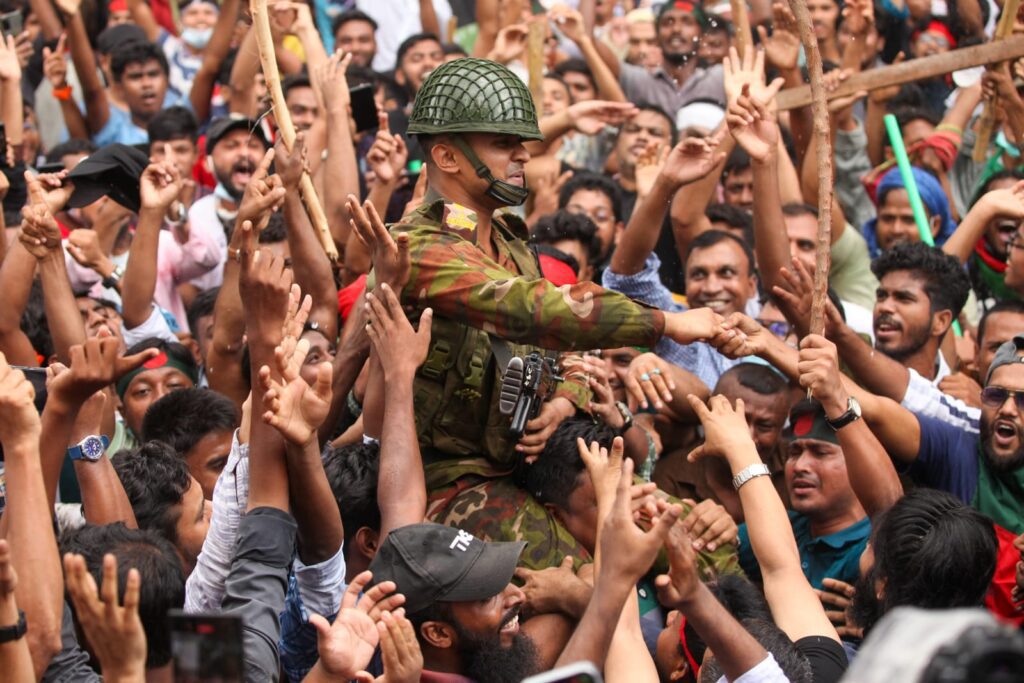Autocratic regimes have a habit of ending quickly. On Monday, after weeks of violent protests, Bangladesh’s Prime Minister Sheikh Hasina, was ushered into an army helicopter and flown out of the country, after crowds reportedly stormed her residence in Dhaka. The Bangladesh Army chief, General Waker-Uz-Zaman, announced the formation of an interim government, with promises to hold early elections and a return to civilian rule. But the Army will have a difficult job in rebuilding a stable political system that has been undermined by Hasina’s 16 years of autocratic rule. It will also need to navigate competing claims for influence by India and China and a civil war in neighbouring Myanmar.
Although Hasina delivered many years of stability and economic growth to Bangladesh, her government had become increasingly autocratic, essentially squeezing any opposition parties out of the system. Her overthrow is a chance for Bangladesh to renew itself as a democracy. But there will be a lot of challenges.
The good news is that although the Army sees itself as the guardian of Bangladesh’s politics, it may have limited appetite for staying in power for a long period. Bangladesh was under military rule between 1975 and 1990, and a military-backed government last held power for two years up to December 2008, when Hasina and her Awami League won a landslide election.
The biggest loser regionally is India’s Prime Minister Narendra Modi who has a longstanding and close personal relationship with Hasina that included shared leanings towards autocratic politics.
But the Army’s experience in running the country has given it some understanding that being at the forefront of politics can come at a significant cost to its public standing. During the 16 years of Sheikh Hasina’s reign, the Army made considerable efforts to keep itself out of politics. This meant that Hasina generally had to rely on paramilitary police, including the infamous Rapid Action Battalion, to do much of her dirty work.
With the Army back in power, its principal job will be to stabilise the country and to facilitate the creation of new, and preferably secular, political parties that can assume power. This will likely be messy and drawn out.
The ruling Awami League, which won 271 of parliament’s 350 seats in the questionable January 2024 election, will almost certainly splinter. Many of its senior members are irretrievably connected with Hasina and corruption and will have very limited political appeal. But there is also a younger faction in the Awami League, many of them women, who would be keen to step up.
The other main political party, the relatively secular Bangladesh Nationalist Party, would see itself as naturally entitled to assume power after Hasina’s ouster. But its leader, Begum Khaleda Zia, is terminally ill and her son, Tarique Rahman, has long been in exile in London to escape corruption charges. The BNP has largely lost its influence in the country.
The most organised alternatives are various Islamist groups, including the banned Jamaat-e-Islami party. These have been kept away from power for many years, but there is a significant chance that an Islamist-led coalition might win an election if it were held today, even against the Army’s preferences.


The impact of these events for the region will also take a long while to play out.
The biggest loser is India’s Prime Minister Narendra Modi who has a longstanding and close personal relationship with Hasina that included shared leanings towards autocratic politics. Modi and the Indian security establishment have long relied on Hasina to keep Bangladesh stable and stave off the influence of the Islamists as well as regional rival China. With Hasina gone, Modi has now lost his closest ally in South Asia, underlining India’s declining influence among nearly all of its South Asian neighbours.
But overall, the Bangladesh Army would be expected to have a steady hand in Bangladesh’s regional relationships, most likely holding a balanced course between competing claims for influence by India and China.
There is some potential for improvement in Bangladesh’s relations with the United States. Hasina had a long history of personal antipathy towards Washington. This wasn’t helped by the former US Ambassador Peter Haas’ open championing of democratic values and opposition parties in the lead-up to the last election. The United States may now have an opportunity to rebuild its influence – which could potentially be sweetened by military assistance.
But Bangladesh’s biggest foreign policy challenge is the civil war in Myanmar and the potential for a renewed exodus of Rohingya refugees into Bangladesh to join the 1.2 million Rohingyas already sheltering in the country. Fighting has been particularly fierce in the neighbouring Rakhine state, where the nationalist Arakan Army is in the process of soundly defeating the Myanmar government forces – with the Rohingya community caught between them. The Hasina government largely stayed away from trying to shape the outcome of Myanmar’s civil conflict. But the Bangladesh Army could be tempted to play a more active role in Rakhine state, particularly in an effort to keep the remaining Rohingyas where they are, and out of Bangladesh. Such an effort could have unpredictable consequences for Bangladesh.
Australia has important equities in these events. It is certainly in Australia’s interests to see a politically stable and prosperous Bangladesh, preferably as a secular and non-aligned democracy. With a civil war tearing Myanmar apart, there are significant concerns about the stability and security of the Bay of Bengal region. Australia should hope that a military-led government in Bangladesh will be able to overcome the many challenges ahead of it.

